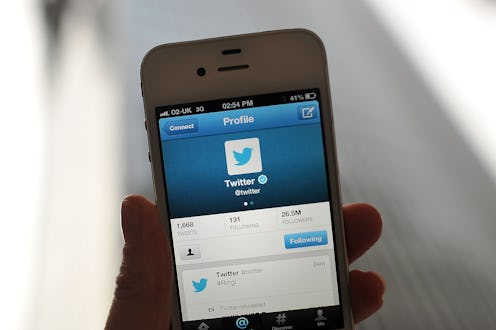News
Iraq's ISIS Knows What It's Doing On Twitter
Facebook and Twitter are powerful tools for organizing and recruiting groups, paving the way for activists, grassroots campaigns, and entrepreneurs to engage with citizens. Unfortunately, social media is helping Iraq's ISIS militant group do the same. The Islamic State of Iraq and Syria (ISIS), the Sunni militant group that has already seized towns in Iraq and Syria, has led a healthy social media campaign in the Middle East; last week, Twitter pulled a violent ISIS account from the site.
ISIS' most successful endeavor, according to The Atlantic, is a Twitter application called The Dawn of Glad Tidings, colloquially known as Dawn. Branded as a news app, Dawn helps push out a mini-social media campaign for whatever message ISIS wants to push. Dawn asks for a treasure trove of personal information when you download it, including permissions to access your Twitter feed, photo/video storage, and WiFi network information.
The app then posts ISIS-written Tweets to your account. Dawn staggers these tweets throughout its users to avoid being flagged by Twitter as spam, and at its height pushes out 40,000 tweets in one day. Suddenly, photos of graphic violence and threatening messages are spreading like wildfire through the social media site, attracting more and more retweets and interaction. The tweets are picked up by hashtag bots, and more people become interested.
While ISIS is one of the most high-profile militant groups on social media, it's certainly not the only one. Jabhat al-Nusra, ISIS' main competitor, has a similar social media following, but lacks the level of engagement that ISIS enjoys. Even the rise of negative attention to ISIS hasn't benefited Nusra: Twitter users using the name Daash — a derogatory name for ISIS used by Nusra and other ISIS detractors — end up devoting more social media love to dissing the militant groups than talking about Nusra. This may ultimately lead to a dip in Nusra's hashtag fundraising dollars.
Gabriel Weimann, a fellow at the Woodrow Wilson Center, published his report, New Terrorism and New Media, last month. Weimann found that terrorist groups were using the same social networks as millennials — Facebook, Instagram, Twitter, Youtube — to recruit and train new members.
In an interview with the National Journal , Weimann identified four key reasons for militants' migration to social media: interactivity, a young target audience, instant access to individuals, and the rise of "lone-wolf terrorism," or terrorist acts committed by individuals not associated with a particular group. Weimann said that the "lone wolves" felt fueled by the virtual pack of extremists. So while they may not have a support structure in their day-to-day lives, their is an entire Internet community at their back. It is a chilling thought, but terrorist groups are largely operating within the same infrastructure essential to any good business: a solid online marketing group. When looking for young recruits, social media gives them proverbial sitting ducks: The personal information is bountiful and the pickings are far from slim. The militant groups' understanding of Facebook and Twitter has given them an edge when searching for the next generation of soldiers, going right to the unifying source for young people: social media.
It is a new front for national security risks, Weimann warns. Like it or not, social media has become an important tool for rallying militant groups, Weimann adds, and we must adapt our strategies accordingly. There's a real opportunity for young, social media savvy activists to push back — but until they do, the militants are running the social media game.
